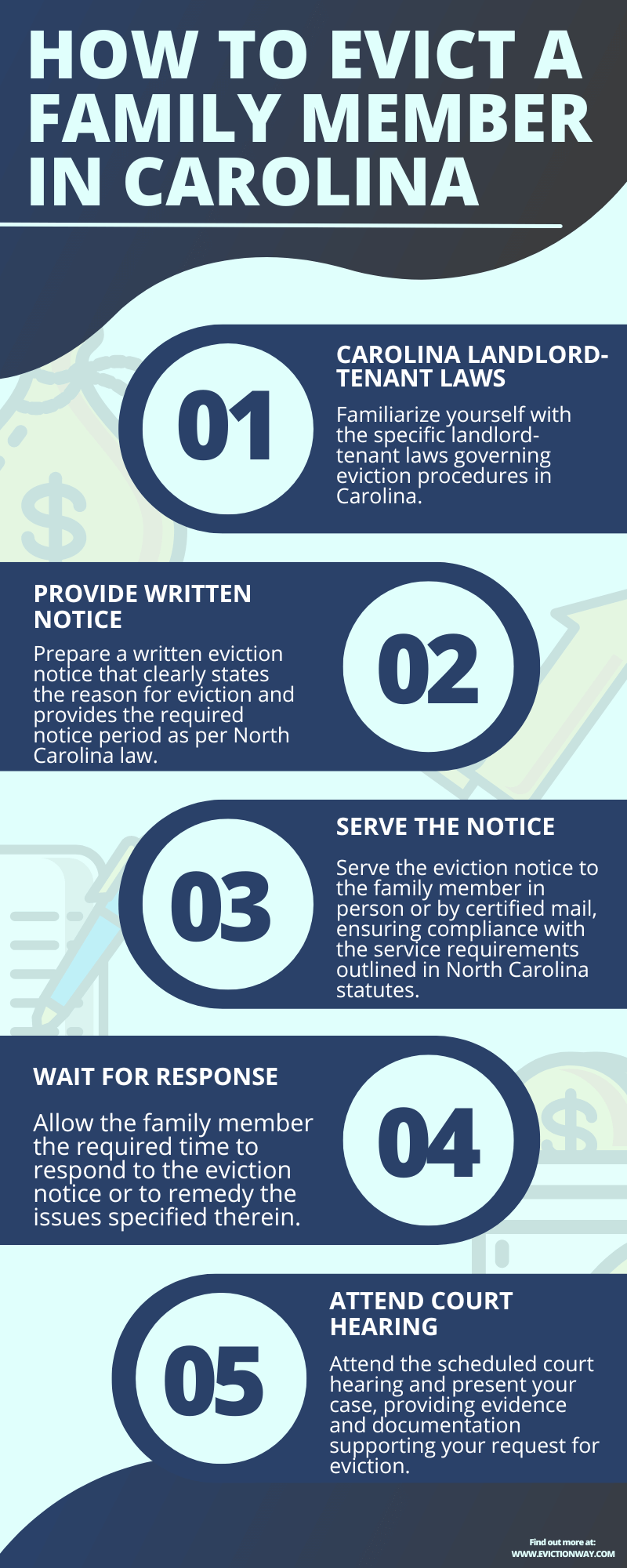It can be tough to evict a family member, especially in Carolina. The laws are different from state to state, and the process can be complicated. But don’t worry, we’re here to help. In this blog post, we’ll share the best way to evict a family member in Carolina. We’ll tell you the method to evict them, and we’ll share tips on removing a family member politely. We’ll also discuss the laws involved and provide some legal tips.

Evicting a family member can be a difficult and emotional process. But it’s important to remember that you have rights as a landlord. If your family member is violating the lease or causing problems, you have the right to evict them.
The first step is to talk to your family member about the situation. Try to resolve the issue without resorting to eviction. If that doesn’t work, you can start the eviction process. The process varies from state to state, but generally, you’ll need to give your family member a written notice to vacate. If they don’t leave by the deadline, you can file a lawsuit to evict them.
How To Evict a Family Member In Carolina
Evicting a family member can be a difficult and emotional process. However, it is important to remember that you have the right to protect your property and your family. If you are considering evicting a family member, it is important to follow the proper legal procedures.
1. Give Notice
The first step in evicting a family member is to give them proper notice. The notice must be in writing and must state the reason for the eviction. The notice must also give the family member a specific date by which they must vacate the property.
2. File a Complaint
If the family member does not vacate the property by the date specified in the notice, you will need to file a complaint with the court. The complaint will state the reason for the eviction and will ask the court to order the family member to vacate the property.

3. Serve the Complaint
Once you have filed the complaint, you will need to serve the family member with a copy of the complaint and a summons. The summons will inform the family member of the date and time of the court hearing.
4. Attend the Court Hearing
At the court hearing, you will need to present your case to the judge. The family member will also have the opportunity to present their case. The judge will then make a decision about whether or not to order the family member to vacate the property.
5. Enforce the Order
If the judge orders the family member to vacate the property, you will need to enforce the order. This may involve hiring a sheriff to remove the family member from the property.
6. Seek Legal Help
If you are considering evicting a family member, it is important to seek legal help. An attorney can help you understand your rights and can guide you through the eviction process.

How Much Does it Cost to Evict a Family Member in Carolina?
Evicting a family member can be a difficult and expensive process. The cost of eviction will vary depending on the specific circumstances of the case, but there are some general costs that you can expect to incur.
| Expense Category | Approximate Cost | Comments |
|---|---|---|
| Filing Fee | $96 – $120 | This is the typical cost to file an eviction lawsuit in most counties in North or South Carolina. |
| Service Fee | $15 – $30 per individual | Fee for the sheriff or process server to deliver the eviction notice. |
| Attorney Fees | $500 – $5,000+ | Attorney fees vary greatly by case complexity and the attorney’s rates. |
| Lost Rent | Variable | This is the potential loss of rental income during the eviction process. |
| Court Costs | $0 – $500 | If the case goes to trial, there could be additional court costs. |
| Damages to Property | Variable | Any damages caused by the tenant may lead to additional repair costs. |
| Locksmith | $100 – $350 | If you need to change locks after eviction. |
| Storage and Removal Costs | $0 – $1,000+ | If the tenant leaves property behind, there could be costs for storage and removal. |
| Relocation Assistance (If any) | Variable | In rare cases, landlords offer some kind of relocation assistance to the evictee. |
| Other Additional Costs | Variable | Any other costs incurred during the process, such as cleanup and marketing for a new tenant. |
- Filing fees: The first step in the eviction process is to file a complaint with the court. The filing fee for an eviction complaint will vary depending on the county in which you live. In most counties, the filing fee is around $100.
- Service of process: Once you have filed your complaint, you will need to have the complaint served on the tenant. The cost of service of process will vary depending on the method of service.
- Attorney fees: If you are unable to evict the tenant on your own, you may need to hire an attorney. The cost of an attorney will vary depending on the attorney’s experience and the complexity of the case.
FAQs: Evicting a Family Member in Carolina
Here are some of the most frequently asked questions about evicting a family member in Carolina:
What are the grounds for evicting a family member in Carolina?
In Carolina, you can evict a family member for the same reasons you would evict any other tenant, such as nonpayment of rent, violating the lease agreement, or engaging in criminal activity on the property.
Do I need to give my family member notice before evicting them?
Yes, you must give your family member proper notice before evicting them. The length of notice required varies depending on the reason for eviction, but it is typically 30 days.

Can I evict my family member if they are not on the lease?
Yes, you can evict a family member even if they are not on the lease. However, you will need to prove that they are a tenant in your home, such as by showing that they have been paying rent or have been living in the home for a significant period of time.
What is the process for evicting a family member?
The process for evicting a family member is the same as the process for evicting any other tenant. You will need to give your family member notice, file a complaint with the court, and attend a hearing.
What are some tips for evicting a family member?
Here are some tips for evicting a family member:
- Document everything, including any communication with your family member and any incidents that lead to the eviction.
- Be prepared to provide evidence of your family member’s tenancy, such as rent payments or a lease agreement.
- Be respectful and professional throughout the process, even if your family member is not.
- Seek legal advice if you are unsure about any aspect of the eviction process.
Related:
